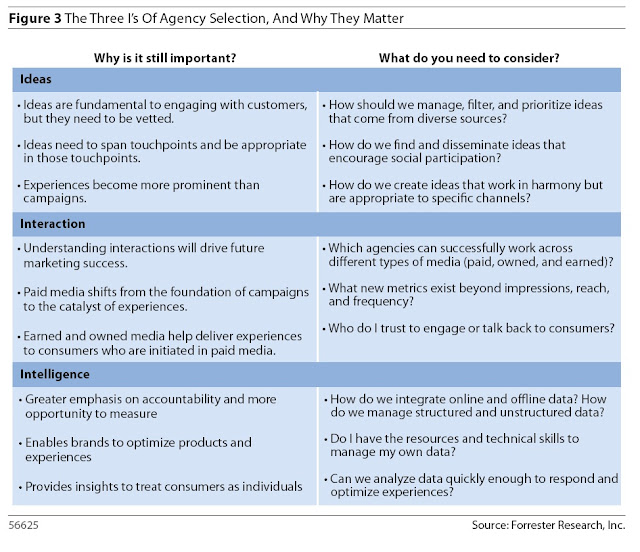Marketing Leaders Must Shift Their Expectations Of Their Agencies
Beyond “digitization” of media, the impact of the Internet on the way people communicate, absorb content, and interact continues to evolve.2 Forrester believes that these changes will drive us into the next phase of marketing, which we call the Adaptive Marketing era:
A period in which marketers must become more adaptable as new channels and constructs for interacting with consumers flood the market that must be tied to the overall brand promise.
In the Adaptive Marketing era, marketers’ new reality — and consequently those of marketing partners — is a world in which the ability, desire, and pace of change are constant, supported by a shift in focus:A period in which marketers must become more adaptable as new channels and constructs for interacting with consumers flood the market that must be tied to the overall brand promise.
· From outbound to surround. Consumers tell us that the marketing that they are exposed to is irrelevant to their interests3 And now consumers can opt out of telemarketing, direct mail, and email; they skip TV ads; and they will publicly blow the whistle on unacceptable advertising practices. Marketers recognize this problem: 62% believe that their TV advertising is less effective than two years ago.4 As Larry Flanagan, CMO of MasterCard, points out, his organization is now “moving from decades of push strategy to a more holistic 360-degree consumer strategy” in order to keep consumers engaged.
· From campaigns to experiences. In an Adaptive Marketing era, the old campaign mindset has to be put out to pasture, but most marketers and agencies still organize, sell, and service from a campaign mindset. The advertising ecosystem is ill-equipped to capture, analyze, and use insight about how to engage best with customers to improve their ongoing experience with the firm. As the former CMO at a global car rental company pointed out, “As media fragmented, agencies approached each channel the same way: as a new means of bombarding the consumer with our message. We found the quality of work declined over time while agencies floundered to layer on skills that just weren’t native to them.”
· From segmented “audiences” to individuals. The days of reach and frequency as effective advertising metrics are on their last legs. But most agencies still apply broad segmentation strategies to new channels. Consumers don’t want to be “targeted” as an audience — they want to participate. Yet most marketers and agencies have a long way to go to fully embrace the notion of customer participation. As one senior marketer commented, “We’re keen to embrace social media, but there’s also a part of me that thinks that anyone with a keyboard is dangerous.”
THE THREE I'S : A FRAMEWORK FOR AGENCY SELECTION
FOR ADAPTIVE MARKETING
FOR ADAPTIVE MARKETING
Most marketers say that they will always need to outsource work for a variety of reasons. But as marketing challenges become ever-faster and more complex, marketers must rethink how, why, and to whom they outsource their marketing needs. In the Adaptive Marketing era, Forrester believes marketers must tap outsiders for (see Figure 3):
· Ideas: emotional connections that can be adapted to all touchpoints. The big ideas behind the “Mad Men”-era campaigns remain relevant because brands must still connect emotionally with their consumers. But digital experiences adapt faster. Consumer control and media fragmentation will require new approaches that help the message hang together wherever they are encountered.
· Ideas: emotional connections that can be adapted to all touchpoints. The big ideas behind the “Mad Men”-era campaigns remain relevant because brands must still connect emotionally with their consumers. But digital experiences adapt faster. Consumer control and media fragmentation will require new approaches that help the message hang together wherever they are encountered.
· Interaction: ever-changing dialogue between brand and consumers. As marketing shifts to focus on pulling in customers, marketers need to rethink the interplay between paid, owned, and earned media.6 This requires marketers to find firms that can stay on top of the conversation wherever it is happening.
· Intelligence: real-time insight into customer behavior. The volume and interdependency of data gathered in multiple fragmented channels provide an opportunity for marketers to learn more about their customers than at any time in the past. The challenge is to gather, analyze, and create actions as these insights materialize.
· Intelligence: real-time insight into customer behavior. The volume and interdependency of data gathered in multiple fragmented channels provide an opportunity for marketers to learn more about their customers than at any time in the past. The challenge is to gather, analyze, and create actions as these insights materialize.





No comments:
Post a Comment
Any comment, please?